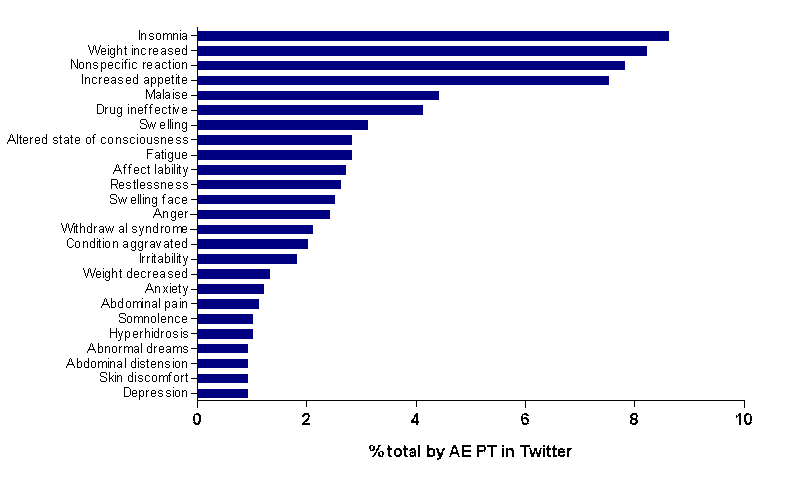Session Information
Session Type: ACR Poster Session C
Session Time: 9:00AM-11:00AM
Background/Purpose: Glucocorticoid (GC) therapy is used widely in patients with inflammatory diseases. However their effectiveness is offset by a range of potential harms. Clinicians and patients have differing views on the importance of certain side effects with GC therapy, which can lead to misunderstanding and a breakdown in doctor-patient relationships. People now readily share their thoughts and experiences of health related matters on social media such as Twitter, including information about medications and their side effects. There are now vast amounts of information within this domain that could return useful knowledge about patient reported adverse events (AEs) with their medications. The aim of this study was to detect and quantify GC-related AEs using a computerised system for automated suspected adverse drug reaction (ADR) detection from narrative text in Twitter.
Methods: All Tweets mentioning prednisolone or prednisone between 1st October 2012 and 30th June 2015 were acquired and anonymised before being processed through automated natural language processing software which mapped possible symptoms (e.g. can’t sleep) to preferred terms (PTs) in the Medical Dictionary for Regulatory Activities (MedDRA®) dictionary (e.g. insomnia). Tweets were automatically categorised using a Bayesian probabilistic model based on their likelihood of containing text relating to a GC related adverse drug reaction (ADR). Tweets with high probability of containing an ADR, defined as proto-AE tweets, were further analysed to determine which AE symptoms appeared most commonly.
Results: There were 81,524 distinct tweets mentioning prednisolone or prednisone between the specified dates. 20,206 were identified as proto-AEs i.e. had a high probability of representing an ADR. Within proto-AE tweets, 26,894 unique PTs were captured. The 5 most commonly reported PTs in proto-AE tweets were ‘insomnia’ (8.6%), ‘weight increased’ (8.2%), ‘non-specific reaction’ (7.8%), ‘increased appetite’ (7.5%) and ‘malaise’ (4.4%) (Figure 1). The top 5 and 25 PTs accounted for 25.0% and 74.6% of all AE PTs respectively.
Conclusion: Insomnia and weight gain were the most frequently reported GC-related AEs posted on Twitter. There remains a disconnect between the frequency of these patient reported AEs and our collective knowledge about these events. Pharmacovigilance in Twitter has the potential to be a valuable, supplementary source of data for determining which drug side effects patients most commonly find troublesome
Figure 1: Glucocorticoid related AE PTs reported in Twitter
To cite this abstract in AMA style:
Patel R, Dasgupta N, Belousov M, Jani M, Winokur C, Nenadic G, Dixon WG. Frequent Discussion of Insomnia and Weight Gain with Glucocorticoid Therapy: An Analysis of Twitter Posts [abstract]. Arthritis Rheumatol. 2016; 68 (suppl 10). https://acrabstracts.org/abstract/frequent-discussion-of-insomnia-and-weight-gain-with-glucocorticoid-therapy-an-analysis-of-twitter-posts/. Accessed .« Back to 2016 ACR/ARHP Annual Meeting
ACR Meeting Abstracts - https://acrabstracts.org/abstract/frequent-discussion-of-insomnia-and-weight-gain-with-glucocorticoid-therapy-an-analysis-of-twitter-posts/

